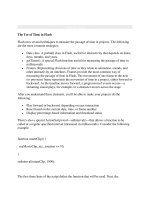Make Use Of privacy policy manual
Bạn đang xem bản rút gọn của tài liệu. Xem và tải ngay bản đầy đủ của tài liệu tại đây (4.08 MB, 46 trang )
How To Write A Privacy Policy For Your
Website
By Amy Mulcreevy, />Edited by Justin Pot.
This manual is the intellectual property of MakeUseOf. It must only be published in its
original form. Using parts or republishing altered parts of this guide is prohibited without
permission from MakeUseOf.com.
Think you’ve got what it takes to write a manual for MakeUseOf.com? We’re always willing
to hear a pitch! Send your ideas to ; you might earn up to $400.
Table Of Contents
1. What Is A Privacy Policy?
2. Privacy Policy Requirements
3. Privacy Policy Best Practices
4. Sample Privacy Policy Clauses
5. Privacy Policy Study Cases
6. Privacy Policy Versus Terms and Conditions
7. Privacy Policy Template
8. Conclusion
MakeUseOf
1. What Is A Privacy Policy?
Launching a website? This guide goes through what you need to know about creating, and
writing, a privacy policy for your website. Don't know if you do need a privacy policy? A
very simple question will answer this for you: do you collect any kind of personal data from
your users? If yes, then you need a privacy policy – it's required by law in most countries.
What is a privacy policy? What are the legal requirements regarding privacy policies? What
are the best practices for writing this agreement?
The guide will answer these questions for you. Please note that this guide is for
informational purposes only, and does not constitute legal advice.
1.1. Definition
The definition of a privacy policy, as outlined by Wikipedia: "a statement or a legal
document that discloses some or all of the ways a party gathers, uses, discloses and
manages a customer or client's data."
So, a privacy policy is a legal statement that tells the user how a company or website
operator may use, gather, manage or share the personal data that the user sends to the
website when using that website or service.
Privacy policies are considered to be one of the most important pieces of information on a
company's website, because it references how users' personal information collected on that
website will be treated. People want to know that the information they enter on a website is
going to be processed correctly and, once stored, it is going to be protected.
What is personal information? Personal information can be anything that can be used to
identify an individual, not limited to but including:
Name
Address
Date of birth
Marital status
Contact information (including telephone number or email address)
Financial records
Credit card information
Medical history
Facebook, with its complex Privacy Settings, is asking for a first name, last name, email
address, gender and birth date when you register for a new account. All of this is personal
information.
For a website operator, the privacy page is where you should declare how you collect,
store, and release personal information you receive from your users. The page needs to
inform the user what specific information is being gathered, and whether it is kept
confidential, shared with third parties and so on.
1.2. Principles
Personal information should only be collected if it's done correctly and in accordance with
the law. When crafting a privacy policy for your site, it might be helpful for you to keep in
mind the following three principles.
Transparency
Users have the right to know how their information is being used. As a point of law, the
website owner must provide his contact details, along with the purpose of processing, the
recipients of the data and any other information that would be relevant to the user to know.
In 2012 Google launched the Good To Know campaign, which promotes privacy
transparency and give users more details on how their information is being used across
Google's services.
In general, personal data can only be processed if the following circumstances are met:
Users have given their consent for their personal information to be collected
When processing of personal information is necessary for the performance of or for
entering into a contract in order to fulfill legal obligations and compliance
When processing is necessary for the purpose of protecting the interests of the user
When processing is necessary for the pursuit of legitimate interests by the data
controller (website owner) or by any third parties to whom the data are disclosed
The user has the right to access the data about him and has the right to demand
rectifications, deletion or blocking of data that is incomplete, inaccurate or isn't being
processed in compliance with the data privacy law.
Legitimate Purpose
It's important to remember the personal data collected by a website owner can only
legitimately be used for the action in which a user has given consent. It cannot be used in
any other way, without the user's permission.
Proportionality
Personal data can only be processed in an adequate and relevant way. It cannot be
processed in an excessive manner of that which it was collected for.
The collected information needs to be accurate and kept up to date. Businesses must take
reasonable steps to make sure that any data collected would not be inaccurate or, if it's
incomplete, to be erased or rectified.
Personal data must be kept in a confidential manner. Businesses must have appropriate
safeguards for processing personal data.
1.3. Quick Facts
Privacy policies are necessary, required by law and also helpful for establishing users'
confidence when using your website.
This type of agreement guides and helps your users know how your site collects and stores
the personal data secure (such as an email address). This practice of being transparent
with your users and potential customers through a privacy policy page can increase trust.
In Aug 2013, The Office of the Australian Information Commissioner (OAIC) released the
results of a "Privacy Sweep" report. The sweep was part of the first international Internet
privacy sweep, an initiative of GPEN (Global privacy Enforcement Network).
The report states that over 65% privacy policies examined have provided information that
was not relevant to the handling of personal information. Some websites did not have a
privacy policy at all.
Among the best practices observed from this Internet sweep was that it's possible to
create a transparent privacy policy by making them easily accessible, simple to read and
with privacy-related information that the consumer would be interested to know.
Google's Shared Endorsements were in the news last year. This feature changed the
details of their privacy policy, but Google provided a web page where users can learn what
these Shared Endorsements are, and how they can opt out of having their profile used for
these ads.
2. Privacy Policy Requirements
For many online businesses, the need for collecting user information is a necessary part of
doing business, but it is the company's or the website owner’s legal obligation to take steps
to properly secure (or dispose of) this data.
Financial data from online financial tools, personal information from children (under 13) and
material derived from credit reports may need additional compliance considerations – as
opposed to an online business with a business model that involves less personal
information.
2.1. Requirements by Country
Since there are different laws for different countries with regard to what is needed to be in
compliance with the law regarding the collection of personal data, here are the summaries
on the main guidelines over data privacy laws for USA, Australia, Canada, United Kingdom,
India, and the European Union.
2.1.1. United States of America (USA)
There are several federal and state laws that have provisions for data privacy in the US,
such as:
the Americans With Disability Act;
the Cable Communications Policy Act of 1984;
the Children’s Internet Protection Act of 2001;
the Computer Fraud and Abuse Act of 1986;
the Computer Security Act of 1997;
the Consumer Credit Reporting Control Act;
and several others.
In every aspect, an American's privacy (in theory) is protected by more than one applicable
federal and state law.
The Federal Trade Commission (commonly referred to as the FTC) is the government office
that regulates data protection for consumers in the US.
The FTC issued a set of guidelines for companies to follow when writing their privacy
policies:
1. What information does the company collect and how does it do so?
2. How does the company protect the information it collects?
3. How does the company use the information it collects?
4. Does the company share the information it collects with others, and if so, what is
shared and with whom is the information shared
5. Do customers have control over their personal data, and if so, what control do they
have?
For different types of companies, the legal requirements of having privacy policies are more
extensive as there are federal (as well as state laws) that regulate what must be disclosed
in a privacy policy by companies that collect, use and share customer information in a
variety of circumstances.
For instance, the Children’s Online Privacy Protection Act (COPPA) governs websites or
online services that collect personal information from children under the age of 13. Some
websites avoid these obligations by discouraging children from using their service
altogether: The Tumblr app is now for only ages 17 & up in the iTunes store.
The Gramm-Leach-Bliley Act regulates the use and sharing of a person's financial details by
financial institutions, and the Health Insurance Portability and Accountability Act governs
privacy in relation to health-care services.
Path, the personal sharing app, was fined $800,000 USD by the FTC for failing to comply
with COPPA and because the app stored the names and numbers from the users'
phonebook without a proper disclosure.
2.1.2. Australia
The Privacy Act of 1988 is the law that governs Australia's data privacy. The act includes
several principles when dealing with personal information of individuals:
11 Information Privacy Principles that apply to public sector agencies
10 National Privacy Principles that apply to Australia-based businesses when they
collect, use and store personal information from Australians
Information related to credit reports (such as credit reports or credit worthiness) is subject
to other specific rules. The Act allows companies to opt-in to be covered by the Act.
For example, the privacy policy of Shop A Docket, an Australian website for deals and
coupons, specifies that they make an effort to handle personal information in accordance
with the Privacy Act of 1998:
We make every effort to maintain the highest standards in dealing with personal
information in accordance with the Privacy Act 1998 (Cth) and the ADMA Code of Practice
("the Law").
2.1.3. United Kingdom (UK)
The Data Protection Act 1998 (or, the DPA) is the governing law on data privacy in the
United Kingdom.
The Data Protection Act controls how your personal information is used by organisations,
businesses or the government - Data protection on GOV.UK
DPA contains strict rules (called principles of data protection) to make sure the data
gathered by businesses is being collected, used and stored correctly.
You can find the full text of the law here. The GOV.UK website summaries these principles:
information is used fairly and lawfully
information is used for limited, specifically stated purposes
information is used in a way that is adequate, relevant and not excessive
information is accurate
information is kept for no longer than is absolutely necessary
information is handled according to people’s data protection rights
information is kept safe and secure
information is not transferred outside the UK without adequate protection.
Hungryhouse, an easy one-stop stop for restaurants in the UK (which also has a mobile
app) mentions in their privacy policy that they comply with the principles of the United
Kingdom's Data Protection Act of 1998:
Hungryhouse.com Ltd. complies with the principles of the 'Data Protection Act, 1998' and
is registered with the Information Commissioner's Office who oversee this act.
2.1.4. Canada
In Canada, the law that governs data privacy is called The Personal Information Protection
and Electronic Documents Act (or, the PIPEDA). You can find the full text of the law here.
The Act applies to businesses that collect, use and store personal information from
Canadians during a commercial activity. Exempt from PIPEDA are businesses that are
subject to provincial legislation that is deemed substantially similar to PIPEDA "with respect
to the collection, use or disclosure of personal information occurring within the respective
province".
Under the PIPEDA act, personal information is defined as information about an identifiable
individual, but does not include the name, title or business address or telephone number of
an employee of an organization. Under this law, active businesses in Canada are required
to:
get the user consent when collecting and using personal information
collect personal information by fair and lawful means
have personal information policies (like the privacy policy) easy to read and easy to
find.
2.1.5. India
The Information Technology Act 2000 (IT Act 2000) incorporates a few provisions regarding
data protection in India. Outside this Act, there are no other dedicated data protection laws
in India.
RedBus, an online bus booking website in India, has its privacy policy similar to what other
websites have. Its agreement covers the most important principles of a privacy policy:
collection, sharing and security of personal information.
2.1.6. European Union (EU)
Countries in the European Union have their own national law that governs data privacy, but
at a European Union level the Directive 95/46/EC or the Data Protection Directive aims to
harmonise these data protection laws across the EU member states. You can find the full
text of the directive here.
Under this directive, the personal information of users can be collected under strict rules
and businesses must respect certain rights of the owners of the personal data.
The names of data privacy laws for various EU member states, per country:
Switzerland: the Federal Law on Data Protection of 1992
Denmark: the Act on Processing of Personal Data of 2000
France: the Data Protection Act of 1978
Germany: the Federal Data Protection Act of 2001
Italy: the Data Protection Code of 2003
Norway: the Personal Data Act of 2000
2.2. Requirements by Third Parties
To run a website, you sometimes use third parties for various purposes: Google Analytics
for stats, MailChimp for sending marketing emails and many other tools.
Some of these third parties may require you adhere to certain requirements in relation to
your website's privacy policy.
Google, for example, requires you to update your privacy policy if you use their remarketing
services (also known as retargeting) from Google AdWords or Remarketing Lists with
Google Analytics.
If you use any advertising service from Google on a website or section of a website that is
covered by the Children's Online Privacy Protection Act (COPPA), you are required to notify
Google of those specific websites or sections.
For a full list of websites covered by COPPA you can use the following tool finder:
/>If you're operating a mobile app with Android, use this link:
/>You must not use interest-based advertising to target past or current activity by users
known by you to be under the age of 13 years. But the disclosure of using remarketing or
retargeting must be included in any privacy policy, regardless of the tool you're using to
benefit from this activity (Google AdWords, Facebook or any other).
This applies to running ads on Facebook as well, even if you do it through a third party like
AdRoll. AdRoll is a Facebook Exchange official partner that you can use for retargeting on
Facebook.
Amazon, with its new “Login With Amazon” service, requires new customers registering with
this service to have a privacy policy and include a URL to their page when registering a new
app.
Depending on which online tools your business is using (or plans to use), it's a good idea to
have a look at their privacy policy to determine how they use the data they're collecting and
if there are any requirements to update your own privacy policy after signing-up as a
member.
3. Privacy Policy Best Practices
The State of California (USA) has been held as a model of Internet privacy policies
worldwide. The California Online Privacy Protection Act of 2003 ("OPPA"), was the first
state law in the nation to require owners of commercial Web sites or online services to post
a privacy policy.
California Attorney General announced measures to improve privacy protections for
consumers who access the Internet through mobile apps.
OPPA applies to any person or entity that owns a commercial Web site or an online service
that "collects and maintains personally identifiable information from a consumer residing
in California who uses or visits" such a website or online service.
It requires businesses to conspicuously post a privacy policy on their websites. According
to OPPA, a privacy policy is conspicuously posted on an website when:
the privacy policy appears on the homepage of the website; or
the privacy policy is directly linked to the homepage via an icon that contains the word
"privacy" and such icon appears in a color different from the background of the
homepage; or
the privacy policy is linked to the homepage via a hypertext link that contains the word
"privacy" written in capital letters equal to or greater in size than the surrounding text, is
written in a type, font, or color that contrasts with the surrounding text of the same
size, or is otherwise distinguishable from surrounding text on the homepage.
The privacy policy page itself must contain the following:
A list of the categories of personally identifiable information the operator collects;
A list of the categories of third-parties with whom the operator may share such
personally identifiable information;
A description of the process (if any) by which the consumer can review and request
changes to his or her personally identifiable information collected by the operator;
A description of the process by which the operator notifies consumers of material
changes to the operator's privacy policy; and
The effective date of the privacy policy.
3.1. How to Name Your Privacy Policy Page
OPPA guidelines require that the word privacy be contained within the name of your privacy
policy page and that it is written in capital letters equal to or greater in size than the
surrounding text.
Here is how Apple.com links to their Privacy Policy page:
It also needs to be written in larger type than the surrounding text, or contrasting type, font
or color to the surrounding text of the same size, or set off from the surrounding text of the
same size by symbols or other marks that call attention to the language.
HubSpot colors all their links in the footer white ("Legal Stuff, Privacy Policy…"), while the
non-linkable text is gray ("Copyright…"):
It's also recommended to place a link to your privacy policy next to fields where you're
requesting personal information from users.
This is how a "Download Now" form on the Marketing Library from HubSpot is placing its
link to its privacy policy when requesting the email address:
While this form requests more personal information than just one email address, a single
link to privacy policy would be enough. Or, you can design the form to include the link
outside any form inputs, but with a clear mention that you value the privacy of your
customers’ information:
3.2. Where to Place Links To Your Privacy Policy Page
A link to your privacy policy page should be placed next to other important information of
your website, such as the contact details and the Terms and Conditions link.
MailChimp groups their Privacy and Terms pages into one single link:
oDesk links their legal pages from a footer section called "Company Info" where you can
find other links, such as About Us, Contact & Support and so on:
The privacy policy link should be listed from the main page of your website. It's normally
found at the bottom of the page, in the footer section, on all pages:









